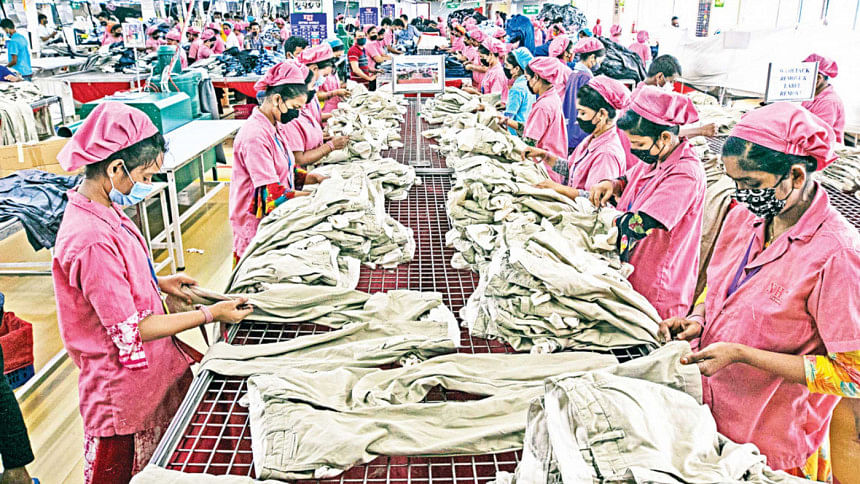Proposed revisions in the EU-GSP scheme: Implications for Bangladesh

As is known, the current provisions of the EU's Generalised System of preferences (EU-GSP) scheme are being revised at present in anticipation of the new scheme to be put in place as of January 1, 2024. When finalised, the scheme will be effective for the next 10 years (2024-2034). Bangladesh has a keen interest in the proposed provisions as it is a major beneficiary of the scheme and has reaped significant benefits in the form of enhanced competitive strength in the EU market and the consequent higher export earnings. The proposals which have been submitted to the EU parliament for discussion, finalisation and decision, will have important implications for Bangladesh also in view of the country's graduation from the LDC group in 2026.
The EU-GSP scheme has three components: the standard GSP scheme for developing countries, the everything but arms (EBA) scheme for the least developed countries (LDCs) and the GSP+ scheme for selected (non-LDC) developing countries. The EBA provides duty-free, quota-free market access for products originating from the LDCs under flexible rules of origin. For example, average import duties on apparels in the EU is 12 percent. An importing EU brand/buyer sourcing ready-made garments from an LDC such as Bangladesh does not have to pay any import duty. This is the case even when the garment has been produced by the LDC producer from imported fabrics since the EBA rules of origin allows one stage conversion for apparels. Exports under the EBA provides Bangladesh's RMG exporters significant competitive edge over other countries which do not enjoy market access under the EBA. The standard GSP scheme provides preferential market access to (non-LDC) developing countries, in the form of duty-free or reduced duties, for 66 percent of tariff lines (of which 26 percent are duty-free, and 40 percent enjoy reduced duty market access). Also to note, the rules of origin (RoO) are more stringent for the standard GSP compared to that for the EBA (e.g., for apparels, the RoO requirement involves two-stage conversion: yarn to fabrics to readymade garmenting). The GSP+ is a special scheme for certain (non-LDC) developing countries as part of which all items in the list of the standard GSP scheme enjoy duty-free market access (e.g., instead of 15 percent duty exemption for apparels allowed under the standard GSP scheme, the GSP+ scheme allows 100 percent duty-free access to the EU market for this item).
As is the case, the EU allows the graduating LDCs an additional three years to enjoy the EBA benefits following the graduation (e.g., for Bangladesh, preferential market access under the EBA will be available till 2029). The new proposals are of relevance to Bangladesh also because it will be in its interest to try to get into the GSP+ scheme on expiry of the EBA.
As of now, all 46 LDCs enjoy the benefits of the EBA scheme; 11 developing countries enjoy the standard GSP and nine developing countries are beneficiaries of the GSP+ scheme. The magnitude of benefits originating from EU's GSP schemes may be understood from the fact that, in 2019, total imports under the three EU-GSP amounted to about 62.0 billion Euros, equivalent to 39 percent of all imports from the GSP beneficiary countries. The amount of imports to the EU under the EBA in 2019 was 25.2 billion Euros (rising from 17.1 billion Euros in 2014), with Bangladesh having by far the largest share in this.
The draft GSP regulations presented to the EU parliament has proposed a number of changes which Bangladesh will need to take into cognisance and study closely.
Firstly, the provisions reemphasise that the EU GSP preferences are extended to countries that "respect international standard and principles related to human rights, including labour rights, as well as environmental protection and good governance". The number of international conventions, on which the GSP sustainable development principles are founded, has been further strengthened with six additional international instruments: (a) the Paris Agreement on Climate Change (replacing the Kyoto Protocol); (b) the Convention on the Rights of Persons with Disabilities (CRPD); (c) The Optional Protocol to the Convention on the Rights of the Child and the Involvement of Children in Armed Conflict (OP-CRC-AC); (d) ILO Convention No. 81 on Labour Inspection; and (e) ILO Convention No. 144 on Tripartite Consultation and (f) The UN Convention against Transnational Organised Crime.
The implication of the proposals is that Bangladesh will not only need to ratify all the 32 international conventions and agreements, it will also be expected to take concrete steps to ensure their compliance in order to enjoy GSP benefits. Since Bangladesh will be eligible and interested to be considered for GSP+, on expiry of the EBA, work on fuller compliance assurance must be given due importance by Bangladesh, beginning from now. EU has also indicated that it will further strengthen monitoring of implementation of the proposed regulations.
Secondly, in a welcome move, the new GSP proposal removes the import share criterion from the GSP+ eligibility (previously this was set at 7.4 percent of the average import for three recent past years which implied that any country whose share was more than 7.4 percent of EU imports from GSP beneficiary countries would not be eligible for GSP+). The new GSP proposal is thus geared to ensure smooth transition from the EBA to the GSP+ status. This will be of significant benefit to the increasingly large group of graduating LDCs. The new provisions envisage that a well-defined framework will be put in place to allow current GSP+ beneficiaries adjust their policies to the new requirements, offering a transition period and requiring articulation of implementation plan. Removal of the ceiling has important implications for Bangladesh as it would not have been eligible for the GSP+ programme had the ceiling been there. Indeed, in the submissions made by the concerned GoB bodies, the Bangladesh mission in Brussels as also civil society organisations such as Centre for Policy Dialogue (CPD), arguments for removal of the threshold was put forward most strongly. On the other hand, the new provisions foresee a faster institutional process as regards GSP withdrawal procedure. This is indicative of more stringent monitoring of the state of compliances by the EU.
Thirdly, according to the new regulations, a product can lose tariff preference if the import value of GSP eligible items exceeds the threshold of 47 percent (as share of import value of items in relevant section) instead of existing 57 percent (for textiles the corresponding shares are 37 percent and 47 percent, respectively). This lowering of ceilings for GSP eligibility by 10 percentage points is not relevant for the EBA or GSP+ scheme, but could become a constraining factor for purposes of eligibility for standard GSP scheme. Bangladesh will need to take note of this and strive to ensure export diversification in the EU market.
From the perspective of preparing for the new GSP regime, following LDC graduation (plus three additional years' of EBA eligibility), Bangladesh will need to undertake the needed policy reforms and build institutional capacities to ensure better economic governance, and strengthen enforcement mechanisms to secure human rights and rights of labour. Work towards better compliance with various international conventions must be strengthened further. Bangladesh should ratify the convention on minimum age for work as early as possible, amend the labour laws, strengthen labour inspection and improve environment friendliness of production processes (e.g., in the leather sector).
Not only ratification of the 32 conventions and agreements, but proper enforcement of those will be important in view of the above. However, improved economic governance, and ensuring labour rights, child rights, rights of people with disability and human rights, as also promoting green growth and environmental sustainability, should demand priority attention not just because these will be monitored strictly for GSP eligibility under the newly proposed regulations, but also because these are in alignment with Bangladesh's aspiration to be an economically developed, socially inclusive and environmentally sustainable country, as has been articulated in the Bangladesh Vision 2041.
Mustafizur Rahman is Distinguished Fellow at the Centre for Policy Dialogue (CPD).

 For all latest news, follow The Daily Star's Google News channel.
For all latest news, follow The Daily Star's Google News channel. 



Comments